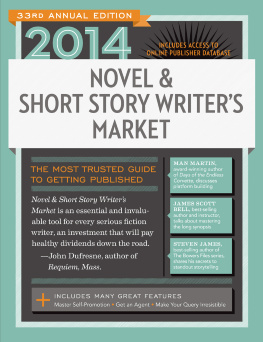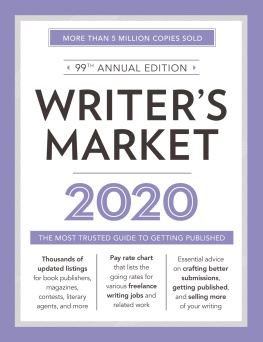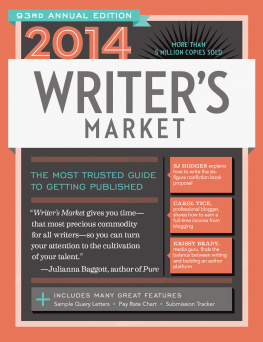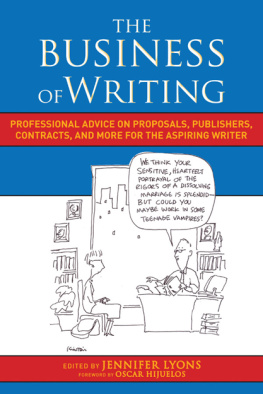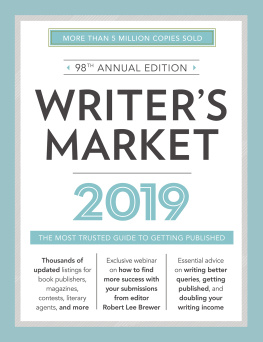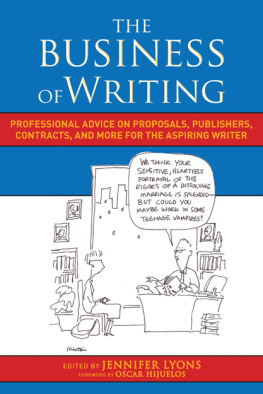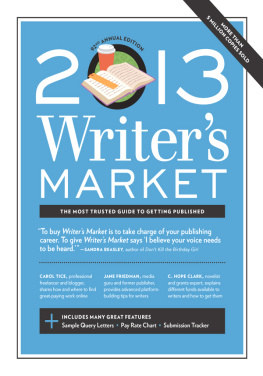From the creator of AbsoluteWrite.com
the
Street-
Smart
Writer
Self-Defense Against
Sharks and Scams
in the Writing World
JENNA GLATZER and DANIEL STEVEN

the
Street-
Smart
Writer
Self-Defense A) | gainst |
Sharks and | Scams |
in the Writing World
Jenna Glatzer and Daniel Steven
To Travis Tea
Nomad Press A division of Nomad Communications 10 9 8 7 6 5 4 3 2 Copyright 2006 by Jenna Glatzer and Daniel Steven All rights reserved.
No part of this book may be reproduced in any form without permission in writing from the publisher, except by a reviewer who may quote brief passages in a review.
The trademark "Nomad Press and the Nomad Press logo are trademarks of Nomad Communications, Inc. Printed in the United States.
ISBN: 0-9749344-4-5
Questions regarding the ordering of this book should be addressedto Independent Publishers Group
814 N. Franklin St.
Chicago, IL 60610
Nomad Press 2456 Christian St.
White River Junction, VT 05001 www.nomadpress.net
Introduction Chapter 1
Contents
Chapter 10
Chapter 11
Acknowledgments
Lauri Berkenkamp is the only editor who will dish about American Idol with me, and that's not even my favorite thing about her. I'd tell you how great she is, but I'd use up my quota of adjectives for the book. If only it weren't for her one tragic flaw: not letting me put a shark bite on the book cover.
Somewhere along the way in my writing career, I earned the title "writers' advocate," but I'm not the first to deserve that title. My scam-hunting hero is Victoria Strauss, an author who's been fighting injustice on behalf of writers for almost a decade. Not only is she tireless in her efforts, she's a remarkable human being who is as classy and caring as she is devoted. A. C. Crispin, James D. Macdonald, Dave Kuzminski, Teresa Nielsen Hayden, and C. E. Petit are all well-deserving of respect and appreciation for all they've done to help keep writers out of trouble. You've been my role models and, I'm honored to say, my friends.
Thank you to my co-author, Daniel Steven, for your enthusiasm, insight, and dedication to this project from the start. Your wisdom added much to this book.
The rest of the thanks belong to:
The folks on the AbsoluteWrite.com forums, for the constant amusement and camaraderie. Thanks, in particular, to the moderators, who set terrific examples.
The Cletians, who are so close to world domination. You are my sanctity.
Professor John Schulz, who told me to "be tough as nails, but never lose your sensitivity."
Amy Brozio-Andrews, my right-hand woman.
The Glatzers and the Policastros for their never-ending support and love.
The writers who psychically email me just at those moments when I'm ready to throw in the towel, to let me know that I made a difference.
Everyone at Nomad Press for being terrific to work with.
Anthony, who says "I love you" a hundred times a day and always finds my shoes.
I wish there were no need for this book. Truth is, when my publisher approached me with the idea for this book, I was hoping to say, "Sorry, there's not enough material on this topic for a whole book." But after reflecting on it for, oh, ten minutes, I realized I could write a book the length of War and Peace about scams and unsavory characters in the writers' world. And that made me realize I had to do it.
The first time I got scammed, I was a ten-year-old budding writer. I had written a poem that I was very proud of, from the point of view of a dying fetus. (Clearly I was a tortured artist in the making.) I sent the poem to a contest I'd found that advertised in the back of a magazine. It offered a big financial grand prize and the possibility of publication.
Introduction
Imagine my delight when the organization running the contest wrote to tell me that my poem was selected as a semi-finalist based on its fine literary merit! As such, it was selected for publication in a gorgeous hardcover anthology of award-winning poetry. I could pre-order my copy right now.
"Mom!" I screamed down the hall. "I'm going to be a published writer! I need some money!"
Reality took a while to sink in, and in the meantime, I entered many more contests of the same caliber.
But my writing career began in earnest when I was 21. By then, I thought I was wise enough to sidestep the potholes in the publishing pavement. Apparently not, because my first "agent" rooked me out of $250, another turned out to be the laughingstock of the industry, and several of my early publishers got away with stiffing me out of the fees they had promised me.
Along the way, I started AbsoluteWrite.com, which became the most popular online magazine for writers. I also started a message board where writers could report their experiences with deadbeat publishers, producers, agents, contests, editors, publicists, and so on. What I found was that the same companies that had rooked me so many years ago were not only still in business, they were thriving. And what was worse was that the scams were obviously multiplying.
Perhaps because would-be scammers saw how profitable others had been when they preyed on the dreams of unsuspecting writers, whole new categories of rip-offs against writers were born. The Internet seemed to be a birthing center of some of the most insidious and deceptive practices, and unfortunately, despite the individuals and writers' organizations working hard to bring down the unscrupulous companies, or at least warn writers about potential pitfalls, the scams remain on the rise. Now they're just even more cleverly worded and harder to spot from a distance.
Because I'm now well-published and well-known in the online writing community, writers frequently come to me for advice when they're unsure of whether or not the company they're dealing with is legitimate. It breaks my heart when I have to tell them that someone who's shown an interest in their work has a bad agenda. Often, it's so exciting for writers to find anyone who takes an interest in their work that they remain blind to warning signs, even when they seem, to an outsider, to be flashing in neon colors.
Scammers seize the opportunity to take advantage of a writers weakness: hope.
I don't need to tell you that writing is a competitive business, and that there's usually a lot of rejection along the path before a novel is bought, a screenplay gets produced, an article is published, or a poem winds up in The New Yorker. Scammers know this, and they seize the opportunity to take advantage of a writer's weakness: hope.
Writers dream. We dream of making it to best-seller lists, of our future Academy Awards speeches, of our Nobel Prizes. We also dream of sharing our stories with the world one way or another, and maybe even getting paid to do so. It's common understanding that we need to pay our dues to get there, so when someoneanyonetells us our work is good, we tend to latch on and let the praise cloud our judgment.
We want to believe that people have good intentions. And, just to put things in perspective, the majority of industry professionals I've dealt with throughout my writing career do have good intentions, and my experiences have been positive the vast majority of the time.
Next page


